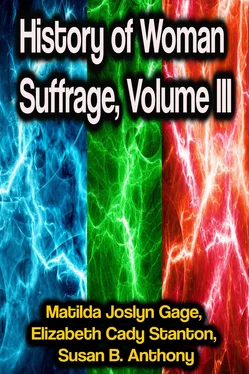William H. Seward said in his great speech on "Freedom and Union," in the United States Senate, February 29, 1860:
Mankind have a natural right, a natural instinct, and a natural capacity for self-government; and when, as here, they are sufficiently ripened by culture, they will and must have self-government, and no other.
Jefferson said:
The God who gave us life, gave us liberty at the same time; the hand of freedom may destroy, but cannot disjoin them.
Few people comprehend the length and breadth of the principle we are advocating to-day, and how closely it is allied to everything vital in our system of government. Our personal grievances, such as being robbed of property and children by unjust husbands; denied admission into the colleges, the trades and professions; compelled to work at starving prices, by no means round out this whole question. In asking for a sixteenth amendment to the United States Constitution, and the protection of congress against the injustice of State law, we are fighting the same battle as Jefferson and Hamilton fought in 1776, as Calhoun and Clay in 1828, as Abraham Lincoln and Jefferson Davis in 1860, namely, the limit of State rights and federal power. The enfranchisement of woman involves the same vital principle of our government that is dividing and distracting the two great political parties at this hour.
There is nothing a foreigner coming here finds it so difficult to understand as the wheel within a wheel in our national and State governments, and the possibility of carrying them on without friction; and this is the difficulty and danger we are fast finding out. The recent amendments are steps in the right direction toward national unity, securing equal rights to all citizens, in every latitude and longitude. But our congressional debates, judicial decisions, and the utterances of campaign orators, continually falling back to the old ground, are bundles of contradictions on this vital question. Inasmuch as we are, first, citizens of the United States, and second, of the State wherein we reside, the primal rights of all citizens should be regulated by the national government, and complete equality in civil and political rights everywhere secured. When women are denied the right to enter institutions of learning, and practice in the professions, unjust discriminations made against sex even more degrading and humiliating than were ever made against color, surely woman, too, should be protected by a civil-rights bill and a sixteenth amendment that should make her political status equal with all other citizens of the republic.
The right of suffrage, like the currency of the post-office department, demands national regulation. We can all remember the losses sustained by citizens in traveling from one State to another under the old system of State banks. We can imagine the confusion if each State regulated its post-offices, and the transit of the mails across its borders. The benefits we find in uniformity and unity in these great interests would pervade all others where equal conditions were secured. Some citizens are asking for a national bankrupt law, that a person released from his debts in one State may be free in every other. Some are for a religious freedom amendment that shall forever separate church and State; forbidding a religious test as a condition of suffrage or a qualification for office; forbidding the reading of the Bible in the schools and the exempting of church property and sectarian institutions of learning or charity from taxation. Some are demanding a national marriage law, that a man legally married in one State may not be a bigamist in another. Some are asking a national prohibitory law, that a reformed drunkard who is shielded from temptation in one State may not be environed with dangers in another. And thus many individual interests point to a growing feeling among the people in favor of homogeneous legislation. As several of the States are beginning to legislate on the woman suffrage question, it is of vital moment that there should be some national action.
As the laws now are, a woman who can vote, hold office, be tried by a jury of her own peers—yea, and sit on the bench as justice of the peace in the territory of Wyoming, may be reduced to a political pariah in the State of New York. A woman who can vote and hold office on the school board, and act as county superintendent in Kansas and Minnesota, is denied these rights in passing into Pennsylvania. A woman who can be a member of the school board in Maine, Wisconsin, Iowa, and California, loses all these privileges in New Jersey, Maryland, and Delaware. When representatives from the territories are sent to congress by the votes of women, it is time to have some national recognition of this class of citizens.
This demand of national protection for national citizens is fated to grow stronger every day. The government of the United States, as the constitution is now interpreted, is powerless to give a just equivalent for the supreme allegiance it claims. One sound democratic principle fully recognized and carried to its logical results in our government, declaring all citizens equal before the law, would soon chase away the metaphysical mists and fogs that cloud our political views in so many directions. When congress is asked to put the name of God in the constitution, and thereby pledge the nation to some theological faith in which some United States citizens may not believe and thus subject a certain class to political ostracism and social persecution, it is asked not to protect but to oppress the citizens of the several States in their most sacred rights—to think, reason, and decide all questions of religion and conscience for themselves, without fear or favor from the government. Popular sentiment and church persecution is all that an advanced thinker in science and religion should be called on to combat. The State should rather throw its shield of protection around those uttering liberal, progressive ideas; for the nation has the same interest in every new thought as it has in the invention of new machinery to lighten labor, in the discovery of wells of oil, or mines of coal, copper, iron, silver or gold. As in the laboratory of nature new forms of beauty are forever revealing themselves, so in the world of thought a higher outlook gives a clearer vision of the heights man in freedom shall yet attain. The day is past for persecuting the philosophers of the physical sciences. But what a holocaust of martyrs bigotry is still making of those bearing the richest treasures of thought, in religion and social ethics, in their efforts to roll off the mountains of superstition that have so long darkened the human mind!
The numerous demands by the people for national protection in many rights not specified in the constitution, prove that the people have outgrown the compact that satisfied the fathers, and the more it is expounded and understood the more clearly its monarchical features can be traced to its English origin. And it is not at all surprising that, with no chart or compass for a republic, our fathers, with all their educational prejudices in favor of the mother country, with her literature and systems of jurisprudence, should have also adopted her ideas of government, and in drawing up their national compact engrafted the new republic on the old constitutional monarchy, a union whose incompatibility has involved their sons in continued discussion as to the true meaning of the instrument. A recent writer says:
The Constitution of the United States is the result of a fourfold compromise: First —Of unity with individual interests; of national sovereignty with the so-called sovereignty of States; Second —Of the republic with monarchy; Third —Of freedom with slavery; Fourth —Of democracy with aristocracy.
It is founded, therefore, on the fourfold combination of principles perfectly incompatible and eternally excluding each other; founded for the purpose of equally preserving these principles in spite of their incompatibility, and of carrying out their practical results—in other words, for the purpose of making an impossible thing possible. And a century of discussion has not yet made the constitution understood. It has no settled interpretation. Being a series of compromises, it can be expounded in favor of many directly opposite principles.
Читать дальше












